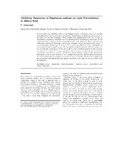Please use this identifier to cite or link to this item:
http://hdl.handle.net/10311/182Full metadata record
| DC Field | Value | Language |
|---|---|---|
| dc.contributor.author | Chaturvedi, P. | |
| dc.date.accessioned | 2008-08-04T09:43:30Z | |
| dc.date.available | 2008-08-04T09:43:30Z | |
| dc.date.issued | 2008-03 | |
| dc.identifier.citation | Chaturvedi, P. (2008) Inhibitory response of Raphanus sativus on lipid peroxidation in albino rats, Evidence-based Complementary and Alternative Medicine, March, 5, pp. 55-59 | en |
| dc.identifier.issn | 1741-4288 | |
| dc.identifier.uri | http://hdl.handle.net/10311/182 | |
| dc.description | eCAM Advance Access originally published online on February 20, 2007 eCAM 2008 5(1):55-59; doi:10.1093/ecam/nel077 Version available here is the 2007 version. | en |
| dc.description.abstract | In the present study, inhibitory effect of the methanol extract of Raphanus sativus root on lipid peroxidation has been carried out in normal rats. Graded doses of methanol extract of root of the plant (40, 80 and 120 mg kg 1 body weight) were administered orally for 15 days to experimental treated rats. Distilled water was administered to experimental control rats. At the end of experiment, rats were killed by decapitation after ether anesthesia. Blood and liver were collected to measure thiobarbituric acid reactive substance, reduced glutathione and activity of catalase. Results indicated that the extract of R. sativus root reduced the levels of thiobarbituric acid reactive substance significantly in all experimental treated groups (P50.05) as compared to the experimental control group. It also increased the levels of reduced glutathione and increased the activity of catalase. In vitro experiments with the liver of experimental control and experimental treated rats were also carried out against cumene hydroperoxide induced lipid peroxidation. The extract inhibited in vitro cumene hydroperoxide induced lipid peroxidation. R. sativus inhibits lipid peroxidation in vivo and in vitro. It provides protection by strengthening the antioxidants like glutathione and catalase. Inclusion of this plant in every day diet would be beneficial. | en |
| dc.language.iso | en | en |
| dc.publisher | Oxford University Press, Oxford Journals; http://ecam.oxfordjournals.org/ | en |
| dc.subject | Catalase | en |
| dc.subject | Glutathione | en |
| dc.subject | Lipid peroxidation | en |
| dc.subject | Raphanus sativus | en |
| dc.subject | Thiobarbituric acid reactive substance | en |
| dc.title | Inhibitory response of Raphanus sativus on lipid peroxidation in albino rats | en |
| dc.type | Article | en |
| Appears in Collections: | Research articles (Dept of Biological Sciences) | |
Files in This Item:
| File | Description | Size | Format | |
|---|---|---|---|---|
| Inhibitory response of raphanus.pdf | 841.37 kB | Adobe PDF |  View/Open | |
| license.txt | License | 1.95 kB | Text | View/Open |
Items in DSpace are protected by copyright, with all rights reserved, unless otherwise indicated.
